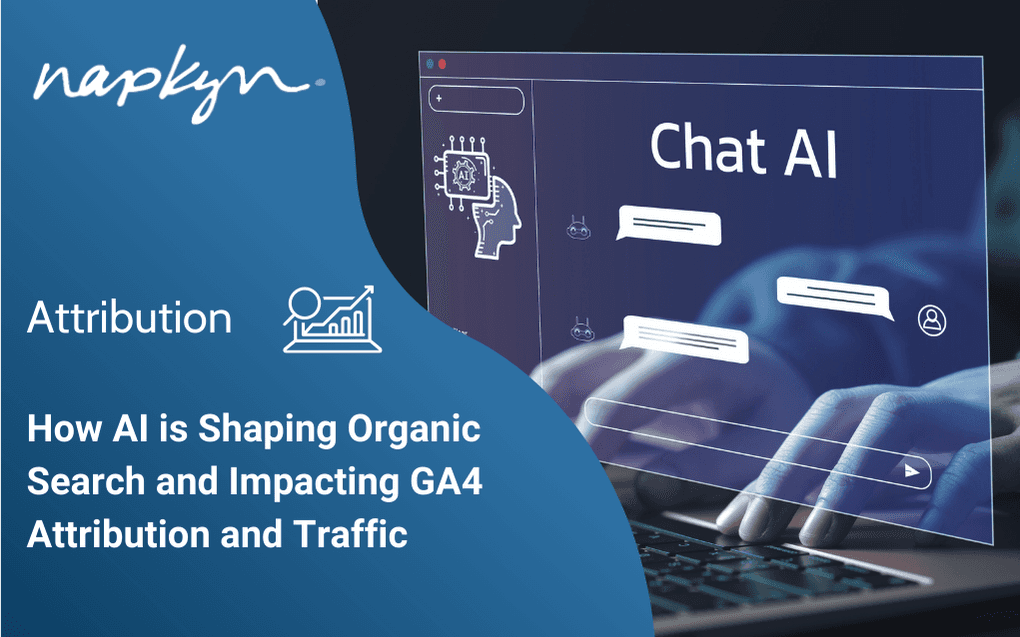

AI's Impact on SEO & GA4: Future-Proof Your Strategy
Discover how AI is revolutionizing organic search and GA4 attribution. Stay ahead of the curve with cutting-edge insights and adapt your SEO strategy for 2025

Monika Boldak
Associate Director, Marketing
The integration of AI into search engines is dramatically changing how users interact with search results, impacting organic traffic, attribution, and channel groupings in Google Analytics 4 (GA4). AI-powered tools such as ChatGPT, Google’s Gemini, and other generative models are altering traditional search behavior, prompting businesses to rethink how they track and analyze traffic in GA4. This blog explores these shifts and their implications for digital marketers.
The Rise of AI in Search
AI-driven tools are increasingly becoming the go-to for users seeking quick, synthesized answers. Google's Search Generative Experience (SGE) provides AI-powered summaries directly at the top of the search results page, answering user queries without requiring a click on a traditional search result.
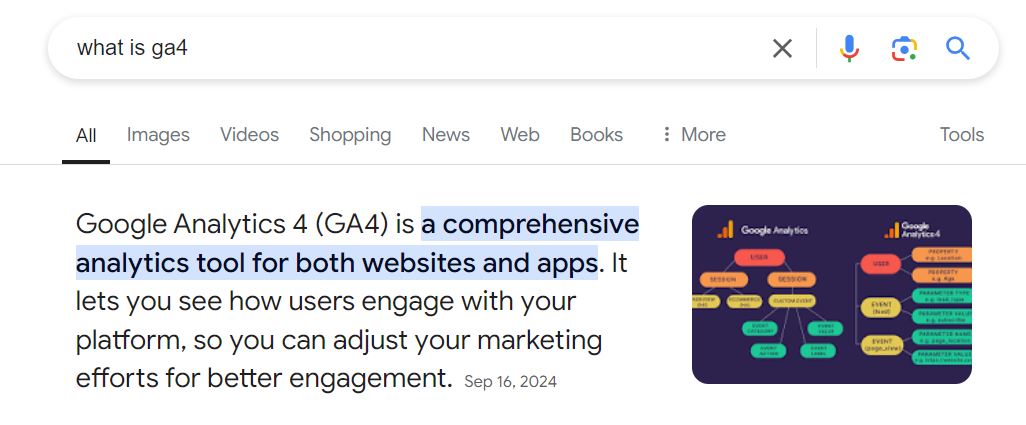
Similarly, tools like ChatGPT and Bing AI deliver direct, conversational answers, further reducing the reliance on traditional search engine listings.
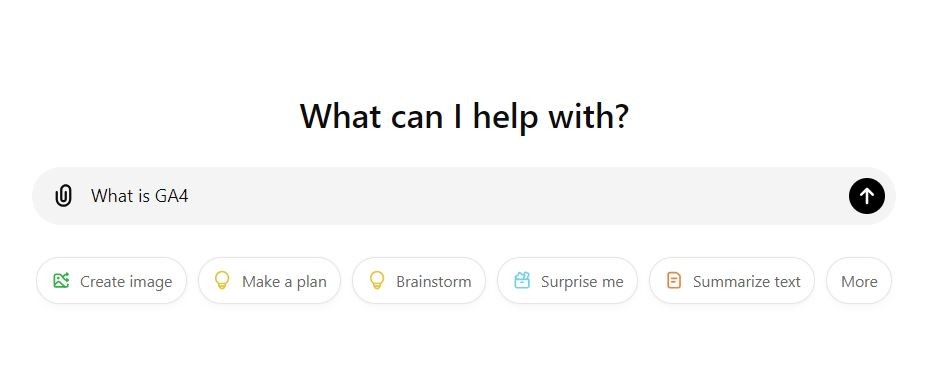
This change in user behavior—where users find what they need from AI summaries rather than clicking through to websites—is having a direct impact on website traffic, particularly organic traffic that previously came from top-of-funnel, informational searches. As AI models continue to evolve and handle more complex queries, the need for users to interact with traditional blue links is steadily declining.
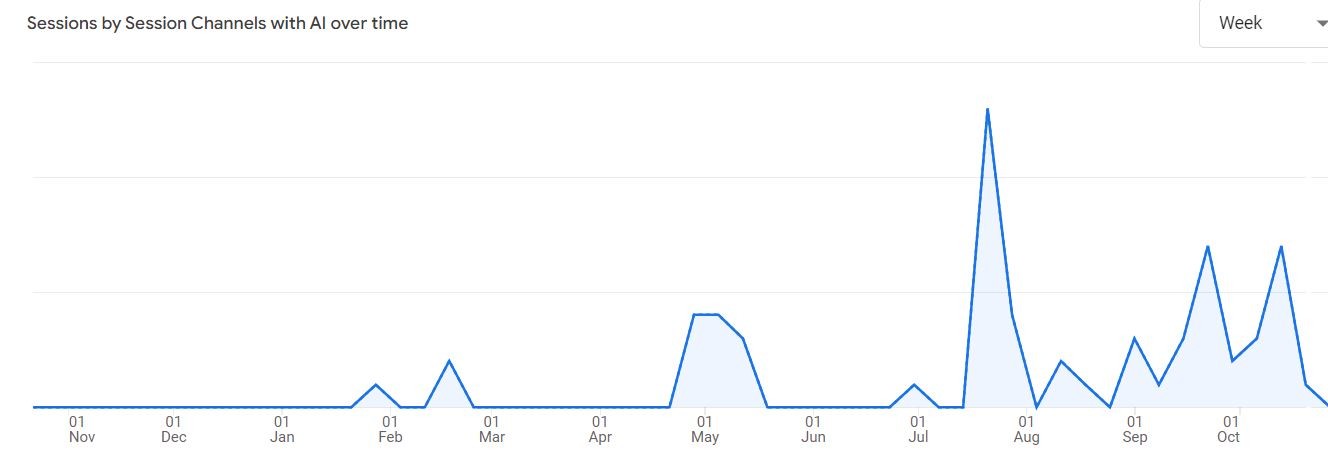
Impact on Organic Traffic in GA4
One of the most significant effects of AI integration into search is a decline in organic traffic. With more users getting their answers directly from AI tools, fewer are clicking through to websites. This decline is particularly evident for businesses that rely on SEO to drive traffic from top-of-funnel queries, such as "how-to" guides, listicles, or educational content.
GA4, which tracks user interactions with websites, may reflect this shift through a noticeable drop in organic sessions. Businesses that rely heavily on organic search may need to diversify their traffic sources or focus more on optimizing for AI-driven searches.
Attribution in GA4 and the Role of AI
Google Analytics 4 introduced a more sophisticated, event-based data model that offers advanced attribution features compared to Universal Analytics. However, with the rise of AI-driven search tools, attribution is becoming more complex.
AI platforms like ChatGPT, Google Gemini, and Perplexity generate traffic to websites in ways that are often indirect or untraceable by standard analytics platforms. While some AI tools are beginning to integrate referral links into their summaries, the volume of traffic that is attributed to these AI tools is still relatively small. In GA4, referral traffic can be tracked from AI platforms by configuring custom channel groupings and using regex filters to capture traffic from sources such as "ChatGPT," "Gemini," or "Perplexity”
Without proper tracking, businesses may struggle to attribute conversions correctly, as much of the AI-driven interaction happens outside of their websites. This can lead to underreporting of traffic sources and confusion over which channels are truly driving conversions. In some cases, it may appear that conversions are coming from "direct" traffic when, in fact, they originated from AI-driven search queries.
Channel Groupings in GA4: Adapting to AI Traffic
GA4 allows for the customization of channel groupings to help businesses better categorize their traffic sources. As AI search tools become a more prominent source of traffic, it is important for businesses to set up new channel groupings that reflect this shift. For example, a business can create a dedicated channel for "AI-driven search" by using regex filters to capture traffic from sources like ChatGPT or Google Gemini.
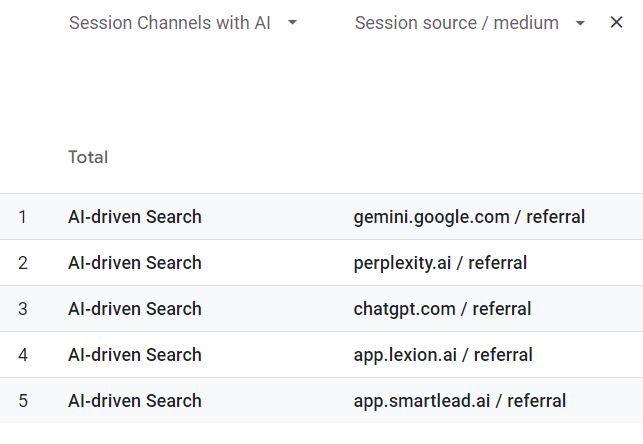
This ensures that businesses can accurately track and analyze the impact of AI-driven search tools on their website traffic, helping them make informed decisions about their marketing strategies. It also allows businesses to compare the performance of traditional search channels against AI-driven ones and adjust their marketing budgets accordingly.
The Overall Impact on Traffic and User Behavior
The rise of AI-powered search has led to notable changes in user behavior. Users are now staying on the search results page longer and engaging more with AI-generated answers.
This behavior means:
fewer pageviews,
shorter session durations, and potentially
lower engagement rates for businesses that rely on organic traffic.
While this may seem like a negative development, it could also mean that
the users who do click through from AI results are more qualified and ready to convert
GA4's real-time and life-cycle reports are essential tools for monitoring how these AI-driven trends affect traffic patterns. By tracking AI referral traffic, session quality, and conversion rates, businesses can better understand the impact of AI on their overall digital presence.
Side note: Session quality refers to how engaged and valuable a user’s visit to a website is. Rather than just counting pageviews or the number of visits, session quality looks deeper into user behavior, such as time spent on the site, interaction with key elements (like buttons or forms), and actions that indicate a meaningful experience.
Preparing for the Future: Strategies for Businesses
As AI continues to reshape the search landscape, businesses must adapt their strategies to remain competitive. This includes optimizing content for AI-driven search tools and focusing on creating high-quality, authoritative content that AI models are likely to reference. Businesses should also leverage GA4’s advanced attribution features to better track and analyze traffic from AI platforms.
By setting up AI-specific channel groupings and refining attribution models, businesses can capture a more accurate picture of how AI-driven traffic is contributing to their digital success. Adjusting key performance indicators (KPIs) to reflect changes in user behavior—such as tracking conversions and engagement rather than raw traffic numbers—will also help businesses thrive in this new era of search.
Conclusion
The integration of AI into search engines is transforming how users interact with search results, leading to a decline in organic traffic and making attribution more complex. For businesses, adapting to this shift requires leveraging the advanced features of Google Analytics 4, including customized channel groupings and refined attribution models. By staying ahead of the curve, businesses can better understand AI-driven traffic and optimize their digital strategies for success in the age of AI-powered search.
More Insights


BigQuery for Marketers: Combine GA4, Google Ads & CRM Data for Smarter Decision

Shreya Banker
Data Scientist
Apr 23, 2025
Read More
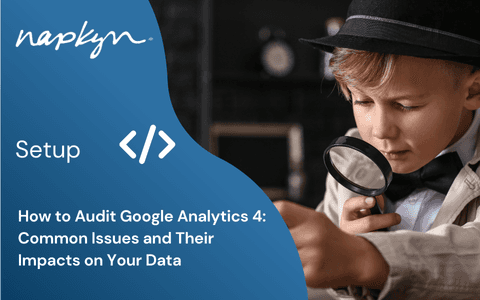

How to Audit Google Analytics 4 (GA4): Common Issues and Their Impacts on Your Data

Hasan Alanam
Manager, Data Solutions
Apr 7, 2025
Read More


How to move a GA4 property from one Google Analytics account to another

Trisha Patel
Senior Analyst, Data Solutions
Apr 2, 2025
Read More
More Insights
Sign Up For Our Newsletter

Napkyn Inc.
204-78 George Street, Ottawa, Ontario, K1N 5W1, Canada
Napkyn US
6 East 32nd Street, 9th Floor, New York, NY 10016, USA
212-247-0800 | info@napkyn.com

AI's Impact on SEO & GA4: Future-Proof Your Strategy
Discover how AI is revolutionizing organic search and GA4 attribution. Stay ahead of the curve with cutting-edge insights and adapt your SEO strategy for 2025

Monika Boldak
Associate Director, Marketing
The integration of AI into search engines is dramatically changing how users interact with search results, impacting organic traffic, attribution, and channel groupings in Google Analytics 4 (GA4). AI-powered tools such as ChatGPT, Google’s Gemini, and other generative models are altering traditional search behavior, prompting businesses to rethink how they track and analyze traffic in GA4. This blog explores these shifts and their implications for digital marketers.
The Rise of AI in Search
AI-driven tools are increasingly becoming the go-to for users seeking quick, synthesized answers. Google's Search Generative Experience (SGE) provides AI-powered summaries directly at the top of the search results page, answering user queries without requiring a click on a traditional search result.

Similarly, tools like ChatGPT and Bing AI deliver direct, conversational answers, further reducing the reliance on traditional search engine listings.

This change in user behavior—where users find what they need from AI summaries rather than clicking through to websites—is having a direct impact on website traffic, particularly organic traffic that previously came from top-of-funnel, informational searches. As AI models continue to evolve and handle more complex queries, the need for users to interact with traditional blue links is steadily declining.

Impact on Organic Traffic in GA4
One of the most significant effects of AI integration into search is a decline in organic traffic. With more users getting their answers directly from AI tools, fewer are clicking through to websites. This decline is particularly evident for businesses that rely on SEO to drive traffic from top-of-funnel queries, such as "how-to" guides, listicles, or educational content.
GA4, which tracks user interactions with websites, may reflect this shift through a noticeable drop in organic sessions. Businesses that rely heavily on organic search may need to diversify their traffic sources or focus more on optimizing for AI-driven searches.
Attribution in GA4 and the Role of AI
Google Analytics 4 introduced a more sophisticated, event-based data model that offers advanced attribution features compared to Universal Analytics. However, with the rise of AI-driven search tools, attribution is becoming more complex.
AI platforms like ChatGPT, Google Gemini, and Perplexity generate traffic to websites in ways that are often indirect or untraceable by standard analytics platforms. While some AI tools are beginning to integrate referral links into their summaries, the volume of traffic that is attributed to these AI tools is still relatively small. In GA4, referral traffic can be tracked from AI platforms by configuring custom channel groupings and using regex filters to capture traffic from sources such as "ChatGPT," "Gemini," or "Perplexity”
Without proper tracking, businesses may struggle to attribute conversions correctly, as much of the AI-driven interaction happens outside of their websites. This can lead to underreporting of traffic sources and confusion over which channels are truly driving conversions. In some cases, it may appear that conversions are coming from "direct" traffic when, in fact, they originated from AI-driven search queries.
Channel Groupings in GA4: Adapting to AI Traffic
GA4 allows for the customization of channel groupings to help businesses better categorize their traffic sources. As AI search tools become a more prominent source of traffic, it is important for businesses to set up new channel groupings that reflect this shift. For example, a business can create a dedicated channel for "AI-driven search" by using regex filters to capture traffic from sources like ChatGPT or Google Gemini.

This ensures that businesses can accurately track and analyze the impact of AI-driven search tools on their website traffic, helping them make informed decisions about their marketing strategies. It also allows businesses to compare the performance of traditional search channels against AI-driven ones and adjust their marketing budgets accordingly.
The Overall Impact on Traffic and User Behavior
The rise of AI-powered search has led to notable changes in user behavior. Users are now staying on the search results page longer and engaging more with AI-generated answers.
This behavior means:
fewer pageviews,
shorter session durations, and potentially
lower engagement rates for businesses that rely on organic traffic.
While this may seem like a negative development, it could also mean that
the users who do click through from AI results are more qualified and ready to convert
GA4's real-time and life-cycle reports are essential tools for monitoring how these AI-driven trends affect traffic patterns. By tracking AI referral traffic, session quality, and conversion rates, businesses can better understand the impact of AI on their overall digital presence.
Side note: Session quality refers to how engaged and valuable a user’s visit to a website is. Rather than just counting pageviews or the number of visits, session quality looks deeper into user behavior, such as time spent on the site, interaction with key elements (like buttons or forms), and actions that indicate a meaningful experience.
Preparing for the Future: Strategies for Businesses
As AI continues to reshape the search landscape, businesses must adapt their strategies to remain competitive. This includes optimizing content for AI-driven search tools and focusing on creating high-quality, authoritative content that AI models are likely to reference. Businesses should also leverage GA4’s advanced attribution features to better track and analyze traffic from AI platforms.
By setting up AI-specific channel groupings and refining attribution models, businesses can capture a more accurate picture of how AI-driven traffic is contributing to their digital success. Adjusting key performance indicators (KPIs) to reflect changes in user behavior—such as tracking conversions and engagement rather than raw traffic numbers—will also help businesses thrive in this new era of search.
Conclusion
The integration of AI into search engines is transforming how users interact with search results, leading to a decline in organic traffic and making attribution more complex. For businesses, adapting to this shift requires leveraging the advanced features of Google Analytics 4, including customized channel groupings and refined attribution models. By staying ahead of the curve, businesses can better understand AI-driven traffic and optimize their digital strategies for success in the age of AI-powered search.
More Insights

BigQuery for Marketers: Combine GA4, Google Ads & CRM Data for Smarter Decision

Shreya Banker
Data Scientist
Apr 23, 2025
Read More

How to Set Up GA4 Ecommerce Tracking (Without Data Loss) | A Complete Step-by-Step Guide

Ricardo Cristofolini
Senior Implementation Specialist, Data Solutions
Apr 16, 2025
Read More

Integrating Google Analytics, Salesforce, and Google Ads for Marketing Superpowers

Monika Boldak
Associate Director, Marketing
Apr 9, 2025
Read More
More Insights
Sign Up For Our Newsletter


